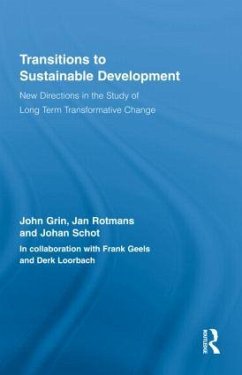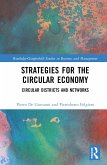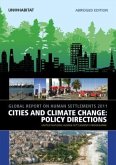John Grin, Jan Rotmans, Johan Schot
Transitions to Sustainable Development
New Directions in the Study of Long Term Transformative Change
John Grin, Jan Rotmans, Johan Schot
Transitions to Sustainable Development
New Directions in the Study of Long Term Transformative Change
- Gebundenes Buch
- Merkliste
- Auf die Merkliste
- Bewerten Bewerten
- Teilen
- Produkt teilen
- Produkterinnerung
- Produkterinnerung
There has been a growing concern about the social and environmental risks which have come along with the progress achieved through a variety of mutually intertwined modernization processes. This book addresses how to understand the dynamics and governance of long term transformative change towards sustainable development.
Andere Kunden interessierten sich auch für
![Not the End of the World Not the End of the World]() Hannah RitchieNot the End of the World9,99 €
Hannah RitchieNot the End of the World9,99 €![Strategies for the Circular Economy Strategies for the Circular Economy]() Pietro de GiovanniStrategies for the Circular Economy174,99 €
Pietro de GiovanniStrategies for the Circular Economy174,99 €![There Is No Planet B There Is No Planet B]() Mike Berners-LeeThere Is No Planet B17,99 €
Mike Berners-LeeThere Is No Planet B17,99 €![We Can Do Better We Can Do Better]() Maja GöpelWe Can Do Better10,99 €
Maja GöpelWe Can Do Better10,99 €![Work, Family Policies and Transitions to Adulthood in Europe Work, Family Policies and Transitions to Adulthood in Europe]() Work, Family Policies and Transitions to Adulthood in Europe61,99 €
Work, Family Policies and Transitions to Adulthood in Europe61,99 €![Cities and Climate Change Cities and Climate Change]() Un-HabitatCities and Climate Change91,99 €
Un-HabitatCities and Climate Change91,99 €![Silicon Values Silicon Values]() Jillian C. YorkSilicon Values22,99 €
Jillian C. YorkSilicon Values22,99 €-
-
-
There has been a growing concern about the social and environmental risks which have come along with the progress achieved through a variety of mutually intertwined modernization processes. This book addresses how to understand the dynamics and governance of long term transformative change towards sustainable development.
Hinweis: Dieser Artikel kann nur an eine deutsche Lieferadresse ausgeliefert werden.
Hinweis: Dieser Artikel kann nur an eine deutsche Lieferadresse ausgeliefert werden.
Produktdetails
- Produktdetails
- Verlag: Taylor & Francis
- Seitenzahl: 418
- Erscheinungstermin: 1. Februar 2010
- Englisch
- Abmessung: 236mm x 156mm x 30mm
- Gewicht: 730g
- ISBN-13: 9780415876759
- ISBN-10: 0415876753
- Artikelnr.: 27870797
- Herstellerkennzeichnung
- Libri GmbH
- Europaallee 1
- 36244 Bad Hersfeld
- gpsr@libri.de
- Verlag: Taylor & Francis
- Seitenzahl: 418
- Erscheinungstermin: 1. Februar 2010
- Englisch
- Abmessung: 236mm x 156mm x 30mm
- Gewicht: 730g
- ISBN-13: 9780415876759
- ISBN-10: 0415876753
- Artikelnr.: 27870797
- Herstellerkennzeichnung
- Libri GmbH
- Europaallee 1
- 36244 Bad Hersfeld
- gpsr@libri.de
John Grin is professor in policy sciences at the Department of Political Science of the University of Amsterdam. He is scientific director of the Amsterdam School of Social Science Research (ASSR), in which some 160 political scientists, sociologists and anthropologists cooperate in an interdisciplinary research programme. Jan Rotmans is one of the founders of Integrated Assessment (IA), and has outstanding experience in IA modeling, scenario-building, uncertainty management and transition management. Since 2004 he has been a full professor in Transitions and Transition Management at Erasmus University Rotterdam in the Netherlands, where he founded the DRIFT-institute: Dutch Research Institute For Transitions. He was vice-president of The Integrated Assessment Society (TIAS), and founder and director of the Dutch Knowledge Network on System Innovations and Transitions (KSI) and co-founder of the Urgenda Foundation. He is currently advisor of the Rotterdam Climate Initiative (RCI) and of the Rotterdam Stadshavens. Johan Schot is professor in social history of technology at the Eindhoven University of Technology. He is research director of the Foundation for the History of Technology, and of the Foundation for System Innovation and Transitions towards Sustainable Development. He is a fellow of the N.W. Posthumus Institute for Social and Economic history, and co-founder and chairing (with Ruth Oldenziel) the Tensions of Europe Collaborative Network and Research Program.
List of Figures. List of Tables. List of Textboxes. Foreword by Carlota
Perez. Preface. Introduction: From Persistent Problems to System
Innovations and Transitions Part 1: The Dynamics of Transitions: A
Socio-Technical Perspective 1.1: Introduction: Exploration of the Research
Topic 1.2: A Multi-Level Perspective on Transitions 1.3: Theoretical
Backgrounds: Crossovers STS, Evolutionary Economics, and Sociology 1.4: A
Typology of Transition Pathways 1.5: Managing Sustainable Innovation
Journeys 1.6: Reflections: Process Theory, Causality and Narrative
Explanation Part 2: Towards a Better Understanding of Transitions and Their
Governance: A Systemic and Reflexive Approach 2.1: Introduction 2.2: A
Complex Integrated Systems Perspective 2.3: Conceptual Framework for
Analyzing Transitions 2.4: Research into the Governance of Transitions: A
Framework for Transition Management 2.5: Case Study I: Parkstad Limburg:
Regional Transition Management 2.6: Case Study II: The Dutch Energy
Transition 2.7: Self-Evaluation of the Development and Prospects of
Transition Management Part 3: Understanding Transitions from a Governance
Perspective 3.1: Introduction 3.2: Contemporary Processes of Institutional
Change 3.3: Modernization Processes in Dutch Agriculture, 1886 to the
Present 3.4: The Governance of Transitions: An Agency Perspective 3.5:
Modernization as Multilevel Dynamics: Lessons from Dutch Agriculture 3.6:
Governance of Transitions: An Analytical Perspective. Conclusion: How to
Understand Transitions? How to Influence Them?: Synthesis and Lessons for
Further Research. Notes. References. Index.
Perez. Preface. Introduction: From Persistent Problems to System
Innovations and Transitions Part 1: The Dynamics of Transitions: A
Socio-Technical Perspective 1.1: Introduction: Exploration of the Research
Topic 1.2: A Multi-Level Perspective on Transitions 1.3: Theoretical
Backgrounds: Crossovers STS, Evolutionary Economics, and Sociology 1.4: A
Typology of Transition Pathways 1.5: Managing Sustainable Innovation
Journeys 1.6: Reflections: Process Theory, Causality and Narrative
Explanation Part 2: Towards a Better Understanding of Transitions and Their
Governance: A Systemic and Reflexive Approach 2.1: Introduction 2.2: A
Complex Integrated Systems Perspective 2.3: Conceptual Framework for
Analyzing Transitions 2.4: Research into the Governance of Transitions: A
Framework for Transition Management 2.5: Case Study I: Parkstad Limburg:
Regional Transition Management 2.6: Case Study II: The Dutch Energy
Transition 2.7: Self-Evaluation of the Development and Prospects of
Transition Management Part 3: Understanding Transitions from a Governance
Perspective 3.1: Introduction 3.2: Contemporary Processes of Institutional
Change 3.3: Modernization Processes in Dutch Agriculture, 1886 to the
Present 3.4: The Governance of Transitions: An Agency Perspective 3.5:
Modernization as Multilevel Dynamics: Lessons from Dutch Agriculture 3.6:
Governance of Transitions: An Analytical Perspective. Conclusion: How to
Understand Transitions? How to Influence Them?: Synthesis and Lessons for
Further Research. Notes. References. Index.
List of Figures. List of Tables. List of Textboxes. Foreword by Carlota Perez. Preface. Introduction: From Persistent Problems to System Innovations and Transitions Part 1: The Dynamics of Transitions: A Socio-Technical Perspective 1.1: Introduction: Exploration of the Research Topic 1.2: A Multi-Level Perspective on Transitions 1.3: Theoretical Backgrounds: Crossovers STS, Evolutionary Economics, and Sociology 1.4: A Typology of Transition Pathways 1.5: Managing Sustainable Innovation Journeys 1.6: Reflections: Process Theory, Causality and Narrative Explanation Part 2: Towards a Better Understanding of Transitions and Their Governance: A Systemic and Reflexive Approach 2.1: Introduction 2.2: A Complex Integrated Systems Perspective 2.3: Conceptual Framework for Analyzing Transitions 2.4: Research into the Governance of Transitions: A Framework for Transition Management 2.5: Case Study I: Parkstad Limburg: Regional Transition Management 2.6: Case Study II: The Dutch Energy Transition 2.7: Self-Evaluation of the Development and Prospects of Transition Management Part 3: Understanding Transitions from a Governance Perspective 3.1: Introduction 3.2: Contemporary Processes of Institutional Change 3.3: Modernization Processes in Dutch Agriculture, 1886 to the Present 3.4: The Governance of Transitions: An Agency Perspective 3.5: Modernization as Multilevel Dynamics: Lessons from Dutch Agriculture 3.6: Governance of Transitions: An Analytical Perspective. Conclusion: How to Understand Transitions? How to Influence Them?: Synthesis and Lessons for Further Research. Notes. References. Index.
List of Figures. List of Tables. List of Textboxes. Foreword by Carlota
Perez. Preface. Introduction: From Persistent Problems to System
Innovations and Transitions Part 1: The Dynamics of Transitions: A
Socio-Technical Perspective 1.1: Introduction: Exploration of the Research
Topic 1.2: A Multi-Level Perspective on Transitions 1.3: Theoretical
Backgrounds: Crossovers STS, Evolutionary Economics, and Sociology 1.4: A
Typology of Transition Pathways 1.5: Managing Sustainable Innovation
Journeys 1.6: Reflections: Process Theory, Causality and Narrative
Explanation Part 2: Towards a Better Understanding of Transitions and Their
Governance: A Systemic and Reflexive Approach 2.1: Introduction 2.2: A
Complex Integrated Systems Perspective 2.3: Conceptual Framework for
Analyzing Transitions 2.4: Research into the Governance of Transitions: A
Framework for Transition Management 2.5: Case Study I: Parkstad Limburg:
Regional Transition Management 2.6: Case Study II: The Dutch Energy
Transition 2.7: Self-Evaluation of the Development and Prospects of
Transition Management Part 3: Understanding Transitions from a Governance
Perspective 3.1: Introduction 3.2: Contemporary Processes of Institutional
Change 3.3: Modernization Processes in Dutch Agriculture, 1886 to the
Present 3.4: The Governance of Transitions: An Agency Perspective 3.5:
Modernization as Multilevel Dynamics: Lessons from Dutch Agriculture 3.6:
Governance of Transitions: An Analytical Perspective. Conclusion: How to
Understand Transitions? How to Influence Them?: Synthesis and Lessons for
Further Research. Notes. References. Index.
Perez. Preface. Introduction: From Persistent Problems to System
Innovations and Transitions Part 1: The Dynamics of Transitions: A
Socio-Technical Perspective 1.1: Introduction: Exploration of the Research
Topic 1.2: A Multi-Level Perspective on Transitions 1.3: Theoretical
Backgrounds: Crossovers STS, Evolutionary Economics, and Sociology 1.4: A
Typology of Transition Pathways 1.5: Managing Sustainable Innovation
Journeys 1.6: Reflections: Process Theory, Causality and Narrative
Explanation Part 2: Towards a Better Understanding of Transitions and Their
Governance: A Systemic and Reflexive Approach 2.1: Introduction 2.2: A
Complex Integrated Systems Perspective 2.3: Conceptual Framework for
Analyzing Transitions 2.4: Research into the Governance of Transitions: A
Framework for Transition Management 2.5: Case Study I: Parkstad Limburg:
Regional Transition Management 2.6: Case Study II: The Dutch Energy
Transition 2.7: Self-Evaluation of the Development and Prospects of
Transition Management Part 3: Understanding Transitions from a Governance
Perspective 3.1: Introduction 3.2: Contemporary Processes of Institutional
Change 3.3: Modernization Processes in Dutch Agriculture, 1886 to the
Present 3.4: The Governance of Transitions: An Agency Perspective 3.5:
Modernization as Multilevel Dynamics: Lessons from Dutch Agriculture 3.6:
Governance of Transitions: An Analytical Perspective. Conclusion: How to
Understand Transitions? How to Influence Them?: Synthesis and Lessons for
Further Research. Notes. References. Index.
List of Figures. List of Tables. List of Textboxes. Foreword by Carlota Perez. Preface. Introduction: From Persistent Problems to System Innovations and Transitions Part 1: The Dynamics of Transitions: A Socio-Technical Perspective 1.1: Introduction: Exploration of the Research Topic 1.2: A Multi-Level Perspective on Transitions 1.3: Theoretical Backgrounds: Crossovers STS, Evolutionary Economics, and Sociology 1.4: A Typology of Transition Pathways 1.5: Managing Sustainable Innovation Journeys 1.6: Reflections: Process Theory, Causality and Narrative Explanation Part 2: Towards a Better Understanding of Transitions and Their Governance: A Systemic and Reflexive Approach 2.1: Introduction 2.2: A Complex Integrated Systems Perspective 2.3: Conceptual Framework for Analyzing Transitions 2.4: Research into the Governance of Transitions: A Framework for Transition Management 2.5: Case Study I: Parkstad Limburg: Regional Transition Management 2.6: Case Study II: The Dutch Energy Transition 2.7: Self-Evaluation of the Development and Prospects of Transition Management Part 3: Understanding Transitions from a Governance Perspective 3.1: Introduction 3.2: Contemporary Processes of Institutional Change 3.3: Modernization Processes in Dutch Agriculture, 1886 to the Present 3.4: The Governance of Transitions: An Agency Perspective 3.5: Modernization as Multilevel Dynamics: Lessons from Dutch Agriculture 3.6: Governance of Transitions: An Analytical Perspective. Conclusion: How to Understand Transitions? How to Influence Them?: Synthesis and Lessons for Further Research. Notes. References. Index.








